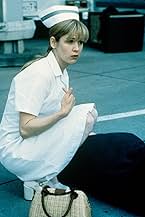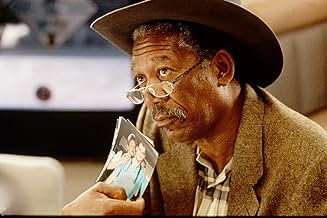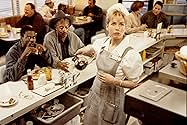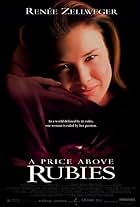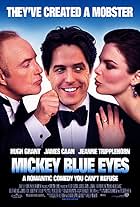CALIFICACIÓN DE IMDb
6.3/10
37 k
TU CALIFICACIÓN
La obsesión postraumática de una viuda con una estrella de telenovela.La obsesión postraumática de una viuda con una estrella de telenovela.La obsesión postraumática de una viuda con una estrella de telenovela.
- Premios
- 5 premios ganados y 14 nominaciones en total
Argumento
¿Sabías que…?
- TriviaProduction designer Charles William Breen used "El mago de Oz (1939)" as inspiration for the look of this movie. If you look closely, you'll find hidden references that pay homage to the 1939 movie.
- ErroresAs Charlie and Wesley are walking away from their broken down car, they argue about the picture of Betty that Charlie keeps looking at. Wesley grabs the picture from Charlie's hand and rips it into 3 pieces. Charlie runs back and picks it up and puts the pieces back together. Only now it is only torn in 2 pieces.
- Créditos curiososWhen the end credits are done, the film's title appears
- Versiones alternativasThe version aired on TV in the USA removes the swearing.
- ConexionesEdited into Nurse Betty: Deleted Scenes (2001)
- Bandas sonorasWhatever Will Be, Will Be (Que Séra, Séra)
Written by Jay Livingston and Ray Evans
Performed by Pink Martini
Courtesy of Heinz Records
Opinión destacada
As Betty Sizemore (Renee Zellweger) secretly watches her tyrannical husband Del (Aaron Eckhart) being murdered by the vengeful hitmen Charlie and Wesley (Morgan Freeman and Chris Rock), her bruised sense of reality becomes totally immersed in the fantasy world of her favorite soap opera. In a state of complete denial and delusion, Betty escapes both physically and mentally from her unsatisfied, small town life to search for "Dr. David Ravell" (Greg Kinnear), the handsome and loving hero of "A Reason to Love", a soap opera set in a hospital and produced in Los Angeles. Immune to reality, Betty arrives in L.A. and becomes "Nurse Betty" as she tries to belong in the hospital world of her dream lover. Meanwhile, the angered Charlie and Wesley track Betty down, convinced she is a dangerous witness who also knows about their compromising dealings with Del.
Nurse Betty creates comedy and suspense by contrasting its main character's extreme innocence and optimism with the evident hypocrisy and violence that surround her. By clearly defining the protagonist's difficult life, Nurse Betty justifies its character's tendency to turn away from reality. Thus, while offering a comment about the popularity of the soap opera within the film, Nurse Betty also makes a comment regarding the widespread addiction to television and its celebrities. In addition, Nurse Betty benefits from the effective manipulation of its protagonist's mental state, particularly in those scenes where she cannot distinguish between "Dr. David Ravell", the character, and George McCord (Greg Kinnear), the actor who plays him. Betty's incapacity to recognize George as an actor leads to funny misunderstandings, which stress the magnitude of her delusional state. However, in spite of these successes, Nurse Betty suffers from the troubling characterizations through which the narration evolves. For example, while Charlie and Wesley are consistently portrayed as a comical pair, the brutality of their actions undermines any sense of appreciation or acceptance the viewer might have initially experienced. Similarly, although the initial scenes establish Del as a detestable man, the humiliation and violence he experiences with his murderers surpass all the humiliation and violence he caused his wife Betty.
Finally, toward the end of the film, Charlie undergoes awkward transformations as he develops an obsession for Betty; an obsession which results in noble feelings of love, and which ultimately destroys him. Consequently, since the characters' roles as victims lack consistency, the story's victimization processes seem random and unsubstantial. All in all, Nurse Betty's indeterminacy --rather than creating suspense-- weakens its characters and pollutes its plot.
Nurse Betty creates comedy and suspense by contrasting its main character's extreme innocence and optimism with the evident hypocrisy and violence that surround her. By clearly defining the protagonist's difficult life, Nurse Betty justifies its character's tendency to turn away from reality. Thus, while offering a comment about the popularity of the soap opera within the film, Nurse Betty also makes a comment regarding the widespread addiction to television and its celebrities. In addition, Nurse Betty benefits from the effective manipulation of its protagonist's mental state, particularly in those scenes where she cannot distinguish between "Dr. David Ravell", the character, and George McCord (Greg Kinnear), the actor who plays him. Betty's incapacity to recognize George as an actor leads to funny misunderstandings, which stress the magnitude of her delusional state. However, in spite of these successes, Nurse Betty suffers from the troubling characterizations through which the narration evolves. For example, while Charlie and Wesley are consistently portrayed as a comical pair, the brutality of their actions undermines any sense of appreciation or acceptance the viewer might have initially experienced. Similarly, although the initial scenes establish Del as a detestable man, the humiliation and violence he experiences with his murderers surpass all the humiliation and violence he caused his wife Betty.
Finally, toward the end of the film, Charlie undergoes awkward transformations as he develops an obsession for Betty; an obsession which results in noble feelings of love, and which ultimately destroys him. Consequently, since the characters' roles as victims lack consistency, the story's victimization processes seem random and unsubstantial. All in all, Nurse Betty's indeterminacy --rather than creating suspense-- weakens its characters and pollutes its plot.
- chrisbrown6453
- 10 jul 2001
- Enlace permanente
Selecciones populares
Inicia sesión para calificar y agrega a la lista de videos para obtener recomendaciones personalizadas
- How long is Nurse Betty?Con tecnología de Alexa
Detalles
- Fecha de lanzamiento
- Países de origen
- Idiomas
- También se conoce como
- Сестричка Бетті
- Locaciones de filmación
- Productoras
- Ver más créditos de la compañía en IMDbPro
Taquilla
- Presupuesto
- USD 35,000,000 (estimado)
- Total en EE. UU. y Canadá
- USD 25,170,054
- Fin de semana de estreno en EE. UU. y Canadá
- USD 7,145,950
- 10 sep 2000
- Total a nivel mundial
- USD 29,364,989
- Tiempo de ejecución1 hora 50 minutos
- Color
- Mezcla de sonido
- Relación de aspecto
- 2.39 : 1
- 2.35 : 1
Contribuir a esta página
Sugiere una edición o agrega el contenido que falta

Principales brechas de datos
By what name was Nurse Betty (2000) officially released in India in English?
Responda





